Estimated reading time: 3 minutes
What is Marketing?
Marketing and Marketing Agreements refers to business activities associated with communicating, advertising, delivering, or selling products or services to customers. A company undertakes the activities to promote the sale of a product or service to the target audience.
Marketing involves getting consumers interested in the product offerings by conducting marketing research and gaining a better understanding of the customers’ interests, tastes, and preferences. In the process, the marketing personnel create a marketing plan, which entails all the activities and channels that the company will use to draw the customer’s attention to the products or services offered.

A well-thought-out and focused marketing plan will help the company keep its marketing efforts centered on the target market and consistently bring in more sales. It should cover the entire process from product creation to distribution methods, sales, and advertising methods.
Now, what is a Marketing Agreements?
A Marketing Agreements are formal contracts between companies (the “Supplier”) and another parties, such as a distributor, reseller, or marketing agency (the “Marketer”). It outlines the terms and conditions governing marketing activities designed to promote the Supplier’s products or services. By setting out roles, responsibilities, and expectations, this agreement creates a structured framework for achieving shared marketing goals.
Purpose and Scope
The primary aim of a Marketing Agreement is to boost brand awareness and drive sales. The scope often includes advertising campaigns, digital marketing, event promotions, and reseller or distribution support. Depending on the arrangement, the agreement can be exclusive or non-exclusive, allowing businesses to either dedicate one partner to marketing or engage multiple channels simultaneously.
Roles and Responsibilities
The Supplier typically provides the product knowledge, promotional materials, and brand guidelines. The Marketer, on the other hand, executes campaigns, manages customer outreach, and ensures compliance with agreed strategies. Clear allocation of duties ensures both parties understand their contributions to the partnership.
Strategic Benefits
A well-drafted Marketing Agreement offers numerous advantages. It allows businesses to expand into new markets, benefit from shared expertise, and reduce costs by pooling resources. It also enhances credibility by leveraging the Marketer’s established networks, fostering stronger customer engagement, and supporting creative, innovative campaigns.
Legal Protections and Obligations
The agreement safeguards both parties by specifying payment terms, confidentiality requirements, intellectual property rights, and termination clauses. These provisions prevent misunderstandings, ensure accountability, and provide mechanisms for resolving disputes. By formalizing the collaboration, both parties can focus on growth while maintaining trust and clarity.
Conclusion
A Marketing Agreement is a powerful strategic tool that aligns businesses with partners capable of amplifying their message and reach. Defining obligations, benefits, and protections ensures long-term collaboration and measurable success in competitive markets.
Check out more pages of our website for related content:
- Digital Marketing Services Agreement
- Letter of Authorization (For marketing negotiation)
- Marketing Agreement
Access the Full Contract Directory Index
You can browse the complete alphabetical list of all commercial, financial, and project-based contract templates by visiting our A–Z Contract Index.
References:
- Investopedia – Understanding Marketing in Business
- American Marketing Association : What is Marketing? The Definition of Marketing…
has been added to your cart!
have been added to your cart!



